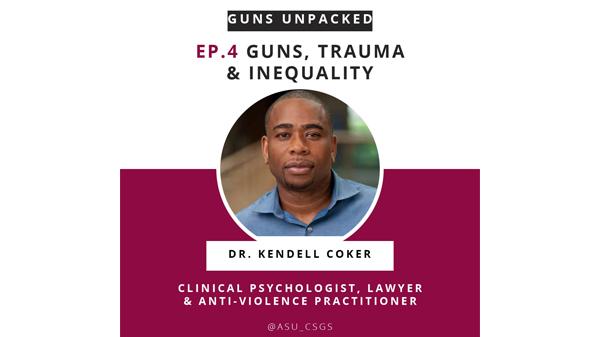Join Guns Unpacked with Dr. Kendell Coker on Guns, Trauma & Inequality

On October 1st, join Guns Unpacked as we discuss trauma, mental health, racial inequality and gun violence with Dr. Kendell Coker of Connecticut College. Dr. Coker initially started as a clinical psychologist examining juvenile delinquency, but has since shifted towards community-based gun violence prevention work. His personal experiences with gun violence helped shape his research focus today, particularly his focus on trauma.
"The effect ripples out far; further than the drop itself."
Listen in as Dr. Coker explains how the experiences of trauma create and exacerbate violence Unraveling how trauma, particularly in response to chronic violence, impacts individuals and communities, he highlights how the differing agendas and intersections between the criminal justice system, mental health care, racism, and classism further complicate addressing trauma, including issues of stigma and lack of access and resources.
"Tying mental health to gun violence also stigmatizes mental health."
Too often, Dr. Coker cautions, conversations around mental health and gun violence often conflate the two, suggesting that mental health issues cause gun violence. But usually, it’s the other way around–gun violence negatively impacts the mental health not just of immediate victims but also their families, friends, and broader communities. In his work, he pushes for a comprehensive approach that integrates both public health and criminal justice perspectives to ensure equitable access to care and support. This also means examining how discrimination, inadequate access to jobs and other basic needs, lack of medical and mental healthcare, and negative outcomes related to criminal justice contact exacerbate the fall-out of gun violence.
"True prevention is not late intervention. It's on the front-end."
Ultimately, this means we must reframe how we understand and address gun violence through social justice and behavioral health lenses. Academics can play a key role in advocating for this reframe, but that also means centering communities. Dr. Coker further emphasizes the importance of reframing the relationship between the researcher and the community they are engaging with: less extraction, more collaboration.
"Academic institutions get millions of dollars, the community gets the crumbs."
Instead of measuring academic achievement in terms of grants awarded and papers published, academic research should work in the interests of the communities studied rather than those of the university. He advocates for an alternative approach, a “radical reversal,” that challenges the approach to addressing gun violence typically taken by researchers–you’ll want to catch the entire episode to learn more.
You can listen to Guns Unpacked on RSS, Spotify, Apple Podcasts and YouTube.